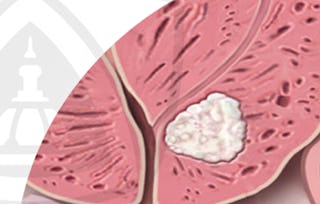Over 500,000 people in the United States and over 8 million people worldwide are dying from cancer every year. As people live longer, the incidence of cancer is rising worldwide, and the disease is expected to strike over 20 million people annually by 2030.

Understanding Cancer Metastasis
Ends soon: Gain next-level skills with Coursera Plus for $199 (regularly $399). Save now.

Understanding Cancer Metastasis
This course is part of Cancer Biology Specialization



Instructors: Kenneth J. Pienta, M.D.
68,298 already enrolled
Included with
(2,533 reviews)
Skills you'll gain
Details to know

Add to your LinkedIn profile
6 assignments
See how employees at top companies are mastering in-demand skills

Build your subject-matter expertise
- Learn new concepts from industry experts
- Gain a foundational understanding of a subject or tool
- Develop job-relevant skills with hands-on projects
- Earn a shareable career certificate

There are 6 modules in this course
In this first module, we'll concentrate on the history and overview of metastasis and give you a flavor of how cancer is defined as well as some of the history surrounding how we began to understand metastasis.
What's included
5 videos1 assignment
In this module, we'll focus on uncontrolled cell division, which is a defining property of cancer, as well as mutation and neoangiogenesis and their roles in tumor formation. We'll also take a look at a primary tumor microenvironment and its component cell types.
What's included
5 videos1 assignment
During this module, we'll turn our attention to the next steps after the initial primary tumor formation, epithelial to mesenchymal transition of cancer cells, and local tumor invasion and intravasation into blood or lymph vessels.
What's included
4 videos1 assignment
We'll now take a close look at cancer survival within the circulation, the role of the circulatory system in metastasis, the genetic determinants of metastatic potential, signalling mechanisms, chemokines, the dock and lock hypothesis, and extravasation.
What's included
6 videos1 assignment
In this module, we'll focus on dormancy and secondary tumor growth and how they contribute to the lethality of cancer.
What's included
6 videos1 assignment
In the previous modules, we've looked closely at the sequential steps of metastasis and some of the biology of how metastasis occurs. Now, we'll turn our attention to morbidity and mortality, or in other words, how cancer hurts and kills people.
What's included
4 videos1 assignment
Earn a career certificate
Add this credential to your LinkedIn profile, resume, or CV. Share it on social media and in your performance review.
Instructors



Offered by
Explore more from Basic Science
 Status: Free Trial
Status: Free TrialJohns Hopkins University
 Status: Free Trial
Status: Free TrialJohns Hopkins University
 Status: Free Trial
Status: Free TrialJohns Hopkins University
 Status: Preview
Status: PreviewYale University
Why people choose Coursera for their career




Learner reviews
2,533 reviews
- 5 stars
86.97%
- 4 stars
11.68%
- 3 stars
0.94%
- 2 stars
0.19%
- 1 star
0.19%
Showing 3 of 2533
Reviewed on Dec 12, 2021
such a nice course will help to think in reseach perspective that our main focus should be to control cancer poison syndrome. such that we can help the people to avoid pain.
Reviewed on May 9, 2021
It's a very thorough course. It not only is informative but is very insightful. I shall recommend this course to every individual who is curious to know more about cancer.
Reviewed on Jun 3, 2018
It is a beautifully designed course. it never gets boring. The best part is that you can learn at your own pace. Thank you all the instructors and Coursera for making the content available.

Open new doors with Coursera Plus
Unlimited access to 10,000+ world-class courses, hands-on projects, and job-ready certificate programs - all included in your subscription
Advance your career with an online degree
Earn a degree from world-class universities - 100% online
Join over 3,400 global companies that choose Coursera for Business
Upskill your employees to excel in the digital economy
Frequently asked questions
To access the course materials, assignments and to earn a Certificate, you will need to purchase the Certificate experience when you enroll in a course. You can try a Free Trial instead, or apply for Financial Aid. The course may offer 'Full Course, No Certificate' instead. This option lets you see all course materials, submit required assessments, and get a final grade. This also means that you will not be able to purchase a Certificate experience.
When you enroll in the course, you get access to all of the courses in the Specialization, and you earn a certificate when you complete the work. Your electronic Certificate will be added to your Accomplishments page - from there, you can print your Certificate or add it to your LinkedIn profile.
Yes. In select learning programs, you can apply for financial aid or a scholarship if you can’t afford the enrollment fee. If fin aid or scholarship is available for your learning program selection, you’ll find a link to apply on the description page.
More questions
Financial aid available,



